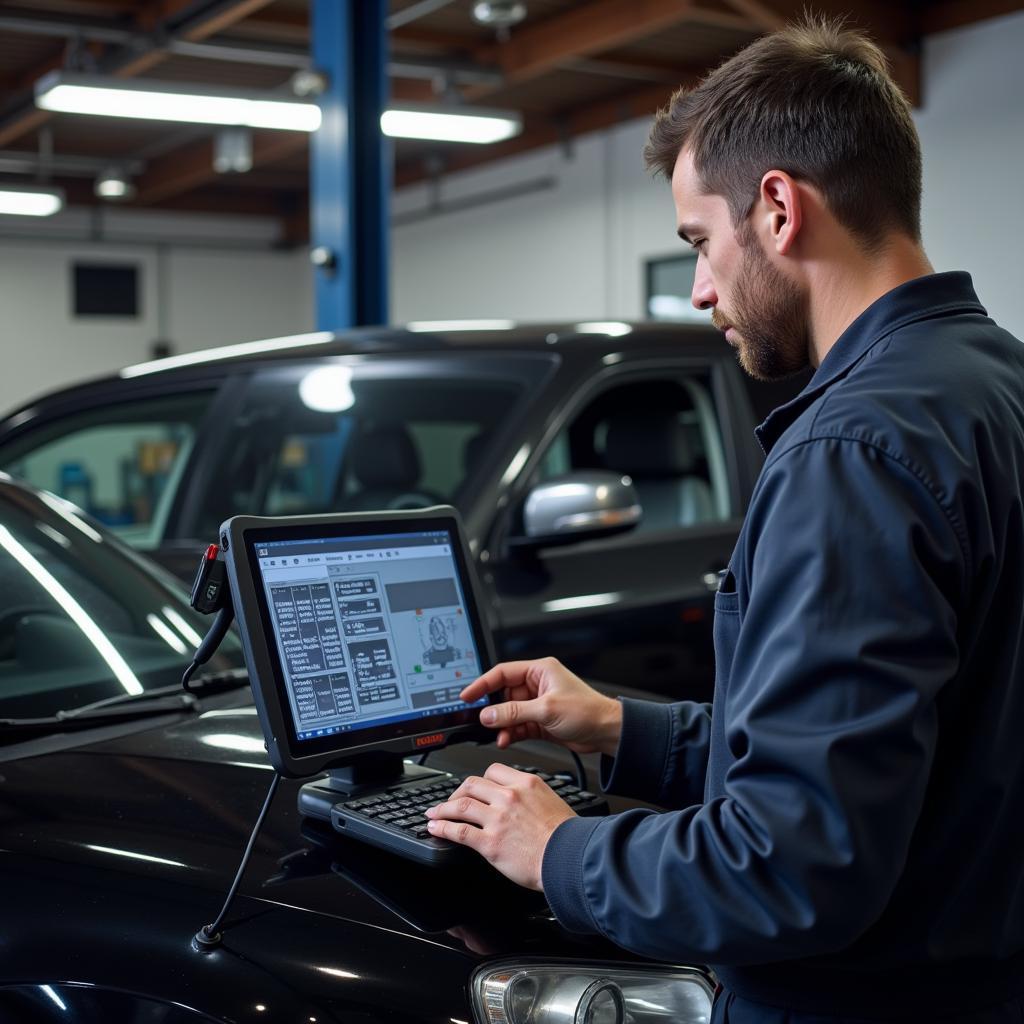Auto Car Diagnostic tools have revolutionized the way we maintain and repair our vehicles. Gone are the days of relying solely on a mechanic’s intuition and experience. Today, with the help of sophisticated software and hardware, we can gain deep insights into the inner workings of our cars, identify potential problems before they escalate, and ensure optimal performance.
What is Auto Car Diagnostic?
Auto car diagnostics involve using electronic tools to interface with a vehicle’s onboard computer system. This system, also known as the Engine Control Unit (ECU), constantly monitors various sensors and components throughout the vehicle, collecting data on everything from engine temperature and fuel pressure to airbag status and emissions levels.
Diagnostic tools tap into this wealth of information, retrieving and interpreting the stored data to:
- Identify current faults and malfunctions: When a problem arises, the ECU generates a Diagnostic Trouble Code (DTC), which is essentially a coded message indicating the nature of the issue. Diagnostic tools can read these codes and provide a clear description of the problem.
- Access real-time data streams: By monitoring live data from various sensors, technicians can observe how different systems are performing in real-time, helping them pinpoint intermittent issues or confirm suspicions.
- Perform system tests and calibrations: Some diagnostic tools allow users to run specific tests on various components, such as activating solenoids or checking sensor responses. This can be invaluable in diagnosing complex issues.
The Benefits of Using Auto Car Diagnostic Tools
- Early Detection of Problems: Diagnostic tools can detect problems in their early stages, often before they manifest as noticeable symptoms. This proactive approach can save you from costly repairs down the line.
- Accurate Diagnosis: By providing precise information about the source of a problem, diagnostic tools eliminate guesswork and ensure that repairs are targeted and effective.
- Cost Savings: While a diagnostic scan itself may cost money, it can save you significant expenses in the long run by preventing misdiagnoses and unnecessary repairs.
- Improved Vehicle Performance: By identifying and addressing minor issues, you can optimize your vehicle’s performance, fuel efficiency, and overall lifespan.
Types of Auto Car Diagnostic Tools
- Code Readers: These entry-level tools can read and clear basic DTCs, making them suitable for DIY enthusiasts who want to troubleshoot simple issues.
- OBD-II Scanners: More advanced than code readers, OBD-II scanners can access a wider range of data, including live sensor readings and freeze frame data, providing a more comprehensive view of your vehicle’s health.
- Professional-Grade Diagnostic Scanners: Used by mechanics and dealerships, these high-end tools offer comprehensive functionality, including advanced coding, programming, and bi-directional control capabilities.
 Mechanic Using a Diagnostic Scanner on a Car
Mechanic Using a Diagnostic Scanner on a Car
Choosing the Right Auto Car Diagnostic Tool
When selecting a diagnostic tool, consider your budget, technical expertise, and the specific needs of your vehicle.
- DIY Enthusiasts: A basic code reader or an OBD-II scanner with live data capabilities would be sufficient for most basic troubleshooting tasks.
- Advanced Users: If you’re comfortable with more technical aspects, an OBD-II scanner with advanced features like ABS and airbag system access might be a better choice.
- Professional Mechanics: For comprehensive diagnostics and repair capabilities, professional-grade diagnostic scanners are essential.
The Future of Auto Car Diagnostics
As vehicles become increasingly sophisticated, so too will diagnostic tools. We can expect to see:
- Cloud-based diagnostics: Data from vehicles will be uploaded to the cloud, allowing for remote diagnostics and predictive maintenance.
- Artificial Intelligence (AI) Integration: AI algorithms will analyze diagnostic data to provide even more accurate diagnoses and predict potential problems before they occur.
Conclusion
Auto car diagnostics are an indispensable part of modern vehicle maintenance and repair. By providing deep insights into a vehicle’s health, these tools empower car owners and mechanics to make informed decisions, saving time, money, and potential headaches. As technology continues to evolve, we can expect auto car diagnostics to become even more powerful and accessible, further transforming the way we interact with our vehicles.

Leave a Reply